Related Research Articles

Lionel Groulx was a Canadian Roman Catholic priest, historian, professor, public intellectual and Quebec nationalist.
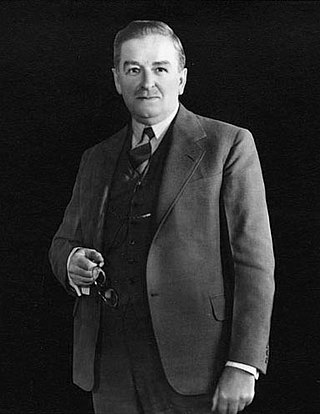
Maurice Le Noblet Duplessis,, byname "Le Chef", was a Canadian lawyer and politician who served as the 16th premier of Quebec. A conservative, nationalist, populist, anti-communist, anti-unionist and fervent Catholic, Duplessis and his party, the Union Nationale, dominated provincial politics from the 1930s to the 1950s. With a total of 18 years and 82 days in office, he remains the longest-serving premier in Quebec history.

Joseph-Napoléon-Henri Bourassa was a French Canadian political leader and publisher. In 1899, Bourassa was outspoken against the British government's request for Canada to send a militia to fight for Britain in the Second Boer War. Prime Minister Sir Wilfrid Laurier's compromise was to send a volunteer force, but the seeds were sown for future conscription protests during the World Wars of the next half-century. Bourassa unsuccessfully challenged the proposal to build warships to help protect the empire. He led the opposition to conscription during World War I and argued that Canada's interests were not at stake. He opposed Catholic bishops who defended military support of Britain and its allies. Bourassa was an ideological father of French-Canadian nationalism. Bourassa was also a defining force in forging French Canada's attitude to the Canadian Confederation of 1867.
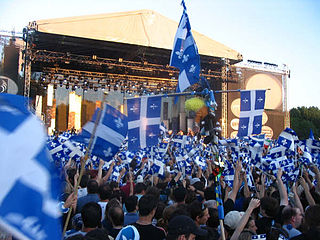
Quebec nationalism or Québécois nationalism is a feeling and a political doctrine that prioritizes cultural belonging to, the defence of the interests of, and the recognition of the political legitimacy of the Québécois nation. It has been a movement and a central issue in Quebec politics since the beginning of the 19th century. Québécois nationalism has seen several political, ideological and partisan variations and incarnations over the years.
Marcel Trudel was a Canadian historian, university professor (1947–1982) and author who published more than 40 books on the history of New France. He brought academic rigour to an area that had been marked by nationalistic and religious biases. His work was part of the marked changes to Quebec society during the Quiet Revolution. Trudel's work has been honoured with major awards, including the Governor General's Literary Award for French Non-Fiction in 1966, and a second nomination for the award in 1987.
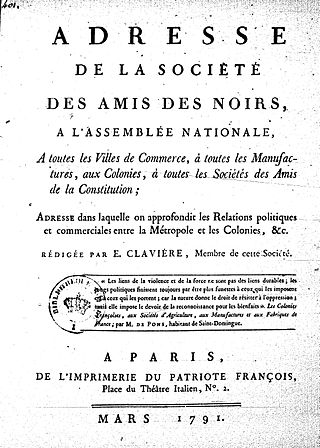
The Society of the Friends of the Blacks was a French abolitionist society founded by Jacques Pierre Brissot and Étienne Clavière and directly inspired by the Society for Effecting the Abolition of the Slave Trade founded in London in 1787. The society's aim was to abolish both the institution of slavery in the France's overseas colonies and French involvement in the Atlantic slave trade.
Raymond Barbeau was a teacher, essayist, literary critic, political figure and naturopath. He was one of the early militants of the contemporary independence movement of Quebec.

The Battle of Lacolle was fought on November 7, 1838, between Loyal Lower Canada volunteer forces under Major John Scriver and Patriote rebels under Colonel Ferdinand-Alphonse Oklowski. On November 6, on their way to Lacolle, the Patriote rebels had won a first skirmish, but they lost in the final confrontation the next day. The battle lasted half an hour.
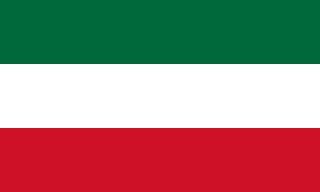
The patriotes movement was a political movement that existed in Lower Canada from the turn of the 19th century to the Patriote Rebellion of 1837 and 1838 and the subsequent Act of Union of 1840. The partisan embodiment of the movement was the Parti patriote, which held many seats in the Legislative Assembly of Lower Canada.

L'Assemblée des six-comtés, also known as Manifestation des Canadiens contre le gouvernement anglais, à Saint-Charles, en 1837, is a large oil painting executed on canvas by Ontario artist Charles Alexander Smith in 1890.

The Pied-du-Courant Prison is a prison museum in Montreal, Quebec, Canada near the Saint Lawrence River and the Jacques-Cartier Bridge.

The Patriote flag was used by the Patriote movement in Lower Canada between 1832 and 1838.
The following is an incomplete bibliography of the 1837-1838 insurrections in Lower Canada in the English and French languages, by publication date and document type.
Benoît Fidèle Poirier was a Canadian organist, composer, and music educator. He was a church organist and taught at several educational and religious institutions in Montreal, Quebec. He created a number of compositions for organ and piano.

Parliament Hill is located in Quebec City in the borough of La Cité-Limoilou, specifically in districts of Vieux-Québec—Cap-Blanc—colline Parlementaire and Saint-Jean-Baptiste. In addition to the Parliament Building of Quebec, the Hill has a few shopping streets and residential areas and public green spaces. The hill on which it is located is the promontory of Quebec.
Valentin Jautard was a French-born Canadian lawyer and journalist. Born in Bordeaux, He is best known for his welcome of invading American troops in 1775 during the American Revolution, saying "our chains are broken, blissful liberty restores us to ourselves."

Louis Dantin was the pen name of Eugène Seers, a Canadian writer and editor from Quebec. He is historically most noted as the original editor and publisher of the poetry of Émile Nelligan, although he also published numerous works as a poet, novelist and essayist in his own right.
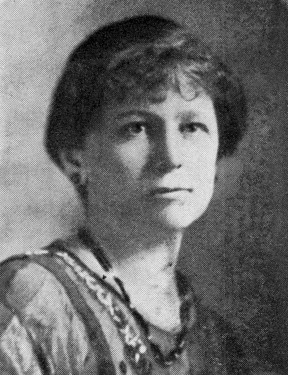
Marie-Claire Daveluy was a Canadian librarian, historian and writer. She is considered a pioneer in library science in Canada.

Marie-Louise Globensky, Lady Lacoste, was a French-speaking Canadian philanthropist and diarist from the province of Quebec. She served as patroness for schools, orphans' homes, and several hospitals, including Sainte Justine, Hôpital Notre-Dame, and the Youville Foundling Hospital. Globensky was president of many benevolent societies, such as Château Ramezay and the Asile de la Providence. Appointed by her daughter Marie Lacoste Gérin-Lajoie, she served as vice-president of the Montreal Council of Women and supported women's suffrage, as long as social order was maintained. She also joined the National Federation of Saint John the Baptist, served on its board, and helped develop programs designed to help working women. A prolific diarist, her journals have contributed to the knowledge of how 19th-century middle-class women dealt with the social structures of their times.
Denyse Baillargeon, born in Verdun in 1954, is a Canadian historian and specialist in the social history of women, the family, and health in Québec. She was a professor of history at the Université de Montréal from 1994 to 2018.
References
- ↑ Revue d'histoire de l'Amérique française (in French). Institut d'histoire de l'Amérique française. 1948. p. 504. Retrieved 21 August 2013.
- ↑ Réal Fortin (1 January 1988). La guerre des patriotes: le long du Richelieu (in French). Mille Roches. p. 206. Retrieved 21 August 2013.